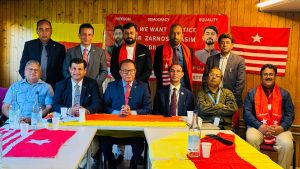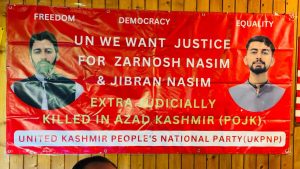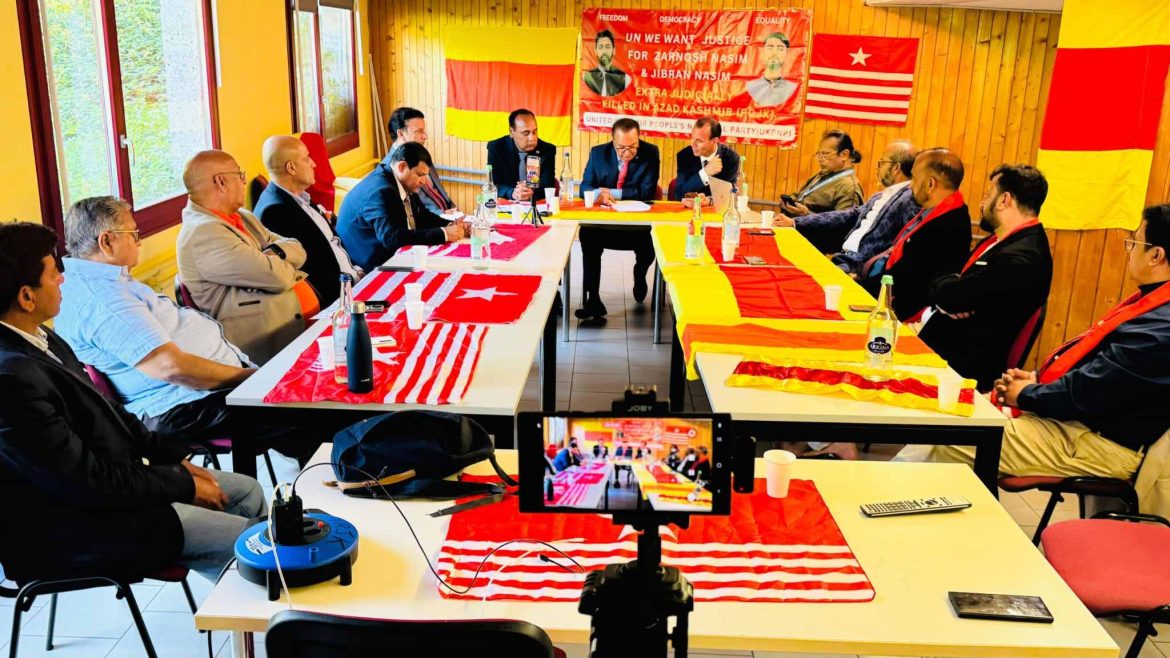The United Kashmir People’s National Party (UKPNP) convened a high-level international conference in Geneva to highlight ongoing human rights concerns in Jammu and Kashmir, and to call for the peaceful reunification of the historically divided region.
The event, held alongside the 59th session of the United Nations Human Rights Council (UNHRC), brought together political leaders in exile, civil society actors, and human rights defenders to draw global attention to what the organisers described as a multi-faceted crisis that demands urgent international scrutiny.
The conference, titled “Pathways to Peace, Security and Fundamental Rights in the State of Jammu & Kashmir”, was attended by a diverse panel of speakers representing marginalised communities from South Asia. Topics ranged from the suppression of civil liberties in Pakistan-administered Kashmir to the strategic use of religious extremism in regional conflicts.
A Struggle for Rights and Identity
Opening the event, Sardar Shaukat Ali Kashmiri, exiled chairman of the UKPNP, reiterated the party’s core position: that Jammu and Kashmir remains a forcibly divided entity whose residents are denied political autonomy, civil rights, and self-determination. “Since its inception, UKPNP has stood for peaceful, democratic resistance,” he said. “We have consistently rejected violence, terrorism, and the weaponisation of religion.”

Sardar Shaukat Ali Kashmiri criticised both Pakistan and India for what he called “unilateral actions” that have disregarded the aspirations of the Kashmiri people. However, he focused much of his speech on developments within Pakistan-administered Azad Jammu and Kashmir (AJK) and Gilgit-Baltistan, where UKPNP claims repression has intensified.
“The region has become a launching ground for proxy conflicts. Religious extremist groups, some proscribed internationally, continue to operate with impunity,” Kashmiri said. “Meanwhile, voices advocating peace, federalism, and secular governance are silenced.”
The Case of Zarnosh and Jibran Nasim
The conference placed significant emphasis on the deaths of Zarnosh and Jibran Nasim—two brothers from Bagh district—who were reportedly killed during a police operation in Rawalakot, AJK, on 28 April 2025. The UKPNP and local observers allege the incident was an extrajudicial killing aimed at suppressing dissent.

The victims’ mother, Shaista Nasim, delivered an emotional address via WhatsApp. “My sons were not criminals. They were educated, peaceful, and principled. Their only fault was to refuse participation in violence,” she said. “We were promised protection. Instead, they were taken from us.”
She further alleged that her sons had been pressured to carry out attacks against local activists, and that when they refused, they were framed and ultimately killed. A video recorded by one of the brothers prior to his death—available in the public domain—reportedly corroborates these claims. “I am a patriotic Kashmiri. I cannot harm my own people,” Zarnosh states in the video.
UKPNP officials confirmed that they have raised the case at multiple international platforms and are urging the UN to demand a judicial inquiry into the incident. They accuse Pakistani authorities of failing to establish a commission, despite public outcry and documented appeals from the victims’ family and civil society groups.
Pattern of Repression in AJK and Gilgit-Baltistan
Speakers alleged a broader pattern of state-backed repression in Pakistan-administered territories, including the use of blasphemy laws, sedition charges, and counter-terrorism legislation to arrest or intimidate critics. Human rights defenders in Gilgit-Baltistan—such as Advocate Ehsan Ali, Mumtaz Nagari, and Sher Nadir Shahi—remain in detention, accused under what UKPNP describes as “fabricated charges”.
Sardar Nasir Aziz Khan, UKPNP’s central spokesperson, said: “Anyone who questions the policies of the Pakistani state or opposes religious radicalism is labelled an agent or traitor. This includes journalists, lawyers, students, and even women activists.”
Khan also highlighted the reported abduction of children in Azad Kashmir. In one such case, the father of three-year-old Muhammad Tabish Khan was allegedly beaten in custody and coerced into signing a false statement. “These are not isolated incidents,” Khan said. “They reflect a climate where fear, coercion, and enforced disappearances have become tools of governance.”
Proxy Militancy and Political Instrumentalisation of Religion
Participants condemned the public activities of banned organisations such as Lashkar-e-Taiba and Hamas affiliates in AJK. According to UKPNP, on 5 February 2025—marked in Pakistan as ‘Kashmir Solidarity Day’—militant figures appeared at rallies in Rawalakot brandishing weapons and issuing threats.
“Instead of disbanding these groups, the authorities promote them,” said Shaukat Ali Kashmiri. “Extremism is now embedded in state ceremonies.”
UKPNP accused the Prime Minister of AJK, Chaudhry Anwar-ul-Haq, of inciting violence by chanting “Al-Jihad” slogans at a political event in Muzaffarabad and pledging state funds for religious militancy.
The party also criticised recent land allocations in AJK, alleging that hundreds of kanals of forest land had been transferred to madrassas and government-backed housing schemes at symbolic rates. They argue these moves contribute to demographic engineering and undermine local environmental and political balance.
Regional and Cross-Border Dimensions
Beyond the confines of Kashmir, the conference featured speakers from other communities affected by alleged state repression in Pakistan. Fazal-ur-Rehman Afridi, Central Leader of the Pashtun Tahafuz Movement (PTM), said that Pashtuns had faced arbitrary detentions, extrajudicial killings, and collective punishment under colonial-era laws.
“Our struggle is peaceful,” said Afridi. “But peaceful protest has been criminalised. Hundreds of our members, including lawmakers, have been arrested under anti-terror laws. Others have disappeared without trace.”
Munir Mengal of the Baloch Voice Association spoke of mass graves, torture, and political assassinations in Balochistan. “The international community must hold Pakistan accountable for its internal policies,” he said. “Balochistan is a cautionary tale of what happens when a state governs through fear and militarisation.”
Rahman Khalil Mamu, representing the International Forum for Secular Bangladesh, discussed the regional implications of radicalisation. He warned that religious minorities and secular voices in Bangladesh now face systematic persecution, allegedly supported by regional actors aiming to destabilise the country.
International Obligations and the UN’s Role
Speakers collectively urged the United Nations to take a more active role. In particular, they called for independent fact-finding missions to visit all parts of Jammu and Kashmir—on both sides of the Line of Control—as well as to investigate enforced disappearances, land seizures, and violations of freedom of speech.
“The Kashmir conflict is often framed as a bilateral territorial issue,” said Jamil Maqsood, UKPNP’s Foreign Affairs Committee chair. “In reality, it is a human rights crisis involving millions of forcibly divided families.”
Maqsood added that the reopening of historical trade and travel routes could serve as an immediate confidence-building measure, while UN-mandated monitoring could provide much-needed transparency.
Support for Democratic Initiatives
UKPNP welcomed the resolutions recently passed by the Jammu and Kashmir Assembly in India, which called for the restoration of special status and full statehood. Although the party maintains a non-aligned position on India-Pakistan politics, it described the move as a reflection of “people’s aspirations for political rights, self-governance, and constitutional recognition.”
Kashmiri reaffirmed UKPNP’s belief in self-determination as articulated in Article 1 of the International Covenant on Civil and Political Rights. “The people of Jammu and Kashmir must be given the opportunity to determine their political future without military coercion or foreign interference,” he said.
Conclusion
The Geneva conference concluded with a call for unity among secular and democratic voices across South Asia. While focusing on Kashmir, the event underscored shared concerns across the region: rising extremism, political repression, and the erosion of democratic space.
“The world must not turn away from Kashmir, Balochistan, Khyber Pakhtunkhwa, or Bangladesh,” said one participant. “These are not isolated crises. They are connected in the wider context of regional stability and international law.”
The United Kashmir People’s National Party closed the event with a renewed commitment to international advocacy and civic mobilisation, reiterating its belief that sustainable peace in South Asia hinges on justice, human rights, and the democratic will of all people concerned.


